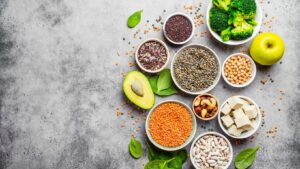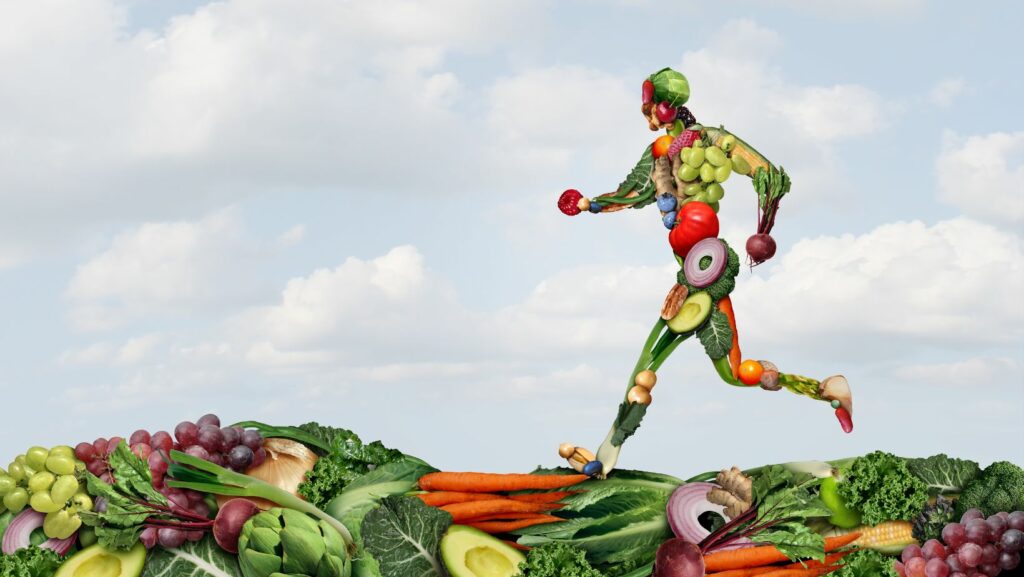Vegan Sports Nutrition
- Vegan Sports Nutrition Basics: A plant-based diet can effectively support athletic performance, recovery, and overall health while aligning with ethical values.
- Nutritional Components: Key elements include plant-based proteins, complex carbohydrates, healthy fats, vitamins, and minerals, all of which are vital for peak athletic performance.
- Essential Nutrients: Athletes should prioritize protein sources (like lentils and quinoa), complex carbs (such as oats and brown rice), and micronutrients (including vitamin B12 and iron) in their diets.
- Meal Planning Strategies: Proper meal planning, including pre- and post-workout nutrition, is essential for optimizing energy levels and recovery times in vegan athletes.
- Supplementation: Vegan athletes may benefit from supplements like protein powders, BCAAs, omega-3 from algae oil, and vitamin B12 to support their nutritional needs and enhance performance.
 As more athletes embrace plant-based diets, vegan sports nutrition is gaining traction in the fitness community. This shift isn’t just a trend; it’s a powerful movement that emphasizes performance, recovery, and overall health without compromising ethical values. With a well-planned vegan diet, athletes can fuel their bodies with nutrient-dense foods that support their training goals.
As more athletes embrace plant-based diets, vegan sports nutrition is gaining traction in the fitness community. This shift isn’t just a trend; it’s a powerful movement that emphasizes performance, recovery, and overall health without compromising ethical values. With a well-planned vegan diet, athletes can fuel their bodies with nutrient-dense foods that support their training goals.
Understanding the principles of vegan sports nutrition is essential for optimizing performance. From protein sources to essential vitamins and minerals, athletes can thrive on a plant-based diet. This article delves into the key components of vegan nutrition, offering insights and tips for those looking to enhance their athletic performance while staying true to their dietary choices.
Understanding Vegan Sports Nutrition
Vegan sports nutrition focuses on providing athletes with optimal energy and nutrients through a plant-based diet. It supports performance and recovery while aligning with ethical beliefs.
Definition and Importance
Vegan sports nutrition involves a dietary approach that eliminates animal products while ensuring adequate nutrient intake. This approach is crucial for athletes as it promotes sustained energy levels, enhances recovery, and supports overall health. A well-structured vegan diet offers a diverse array of nutrients essential for peak performance, making it an effective option for those committed to sports and ethical eating.
Nutritional Components
Key nutritional components in vegan sports nutrition include:
- Proteins: Plant-based proteins, such as legumes, nuts, seeds, and whole grains, provide essential amino acids necessary for muscle repair and growth.
- Carbohydrates: Whole grains, fruits, and vegetables deliver complex carbohydrates that supply energy and endurance during athletic activities.
- Fats: Healthy fats from sources like avocados, olive oil, and nuts contribute to hormone production and support energy needs.
- Vitamins and Minerals: Key micronutrients, including iron, calcium, and vitamin B12, are vital for proper bodily functions and can be sourced from fortified foods or supplements.
- Hydration: Adequate fluid intake, primarily through water and electrolyte-rich beverages, maintains performance and recovery.
Each component plays an integral role in the overall success of an athlete following a vegan diet.
Essential Nutrients for Athletes
Athletes require specific nutrients for optimal performance and recovery. A well-balanced vegan diet can effectively meet these needs through careful planning.
Protein Sources
Plant-based protein sources include lentils, chickpeas, quinoa, and tofu. These foods deliver essential amino acids vital for muscle repair and growth. In particular, lentils provide approximately 18 grams of protein per cooked cup. Incorporating a variety of protein sources ensures athletes receive a complete amino acid profile, which is crucial for training and recovery.
Carbohydrates and Energy
Complex carbohydrates serve as the primary energy source for athletes. Whole grains, such as brown rice and oats, offer sustained energy and help maintain glycogen stores. Fruits like bananas provide quick energy before workouts with their natural sugars and fiber. For instance, one medium banana contains about 27 grams of carbohydrates. Including an adequate amount of carbohydrates supports endurance and performance during workouts.
Vitamins and Minerals
Vitamins and minerals play a crucial role in overall health and athletic performance. Key nutrients include vitamin B12, iron, calcium, and omega-3 fatty acids. Plant-based athletes can obtain iron from sources like spinach and chickpeas; however, pairing these with vitamin C-rich foods enhances absorption. Likewise, fortified plant milks can supply vitamin B12 and calcium, crucial for bone health. Consuming a variety of fruits, vegetables, nuts, and seeds helps meet these nutritional needs effectively.
Meal Planning for Vegan Athletes
Meal planning plays a crucial role in ensuring vegan athletes meet their nutritional needs effectively. A well-structured meal plan can optimize performance and recovery while supporting overall health.
Pre-Workout Nutrition
Pre-workout nutrition focuses on fueling the body to enhance performance during exercise sessions. Vegan athletes should consume meals rich in complex carbohydrates and moderate in protein.
- Timing: Eating 1-2 hours before a workout ensures the body absorbs nutrients effectively.
- Options: Meals can include oatmeal topped with fruits, whole-grain toast with nut butter, or a smoothie made with spinach, bananas, and plant-based protein powder.
- Hydration: Staying hydrated is essential; athletes should drink water or an electrolyte-rich beverage before workouts.
Post-Workout Recovery Meals
Post-workout meals aid in muscle recovery and replenishing energy stores. A focus on protein and carbohydrates is vital right after training.
- Timing: Consuming a recovery meal within 30 minutes boosts amino acid uptake.
- Options: Ideal recovery meals include a quinoa bowl with vegetables and legumes, a chickpea salad, or a protein shake made with almond milk and banana.
- Supplementation: Including a source of omega-3 fatty acids, such as flaxseeds or chia seeds, promotes anti-inflammatory effects and overall recovery.
By prioritizing pre-workout nutrition and post-workout recovery meals, vegan athletes can optimize their athletic performance while adhering to a plant-based diet.
Supplements for Vegan Athletes
Vegan athletes often turn to supplements to ensure they meet their nutritional needs. Proper supplementation can enhance performance, support recovery, and maintain overall health without compromising dietary ethics.
Protein Powders
Protein powders serve as a convenient source of essential amino acids for vegan athletes. Plant-based protein powders, such as pea, rice, and hemp, provide high-quality protein that supports muscle repair and growth. A typical serving of plant-based protein powder contains around 20-30 grams of protein. When selecting a protein supplement, athletes should check for complete amino acid profiles and choose products free from artificial additives. Blends that combine multiple protein sources enhance the amino acid spectrum, making them preferable for optimal muscle recovery.
BCAAs and Other Supplements
 Branched-chain amino acids (BCAAs) benefit vegan athletes by promoting muscle recovery and reducing exercise-induced fatigue. A common dosage is 5-10 grams before or after workouts. Vegan BCAA supplements often derive from fermented plant sources, making them suitable for plant-based diets. In addition to BCAAs, athletes may consider supplements such as omega-3 fatty acids from algae oil, which provide anti-inflammatory benefits. Likewise, creatine, though not typically vegan, can be found in plant-based formulations. Other important supplements to consider include vitamin B12, iron, and calcium, which can be challenging to obtain through diet alone. Such supplements play a crucial role in preventing nutrient deficiencies and supporting overall athletic performance.
Branched-chain amino acids (BCAAs) benefit vegan athletes by promoting muscle recovery and reducing exercise-induced fatigue. A common dosage is 5-10 grams before or after workouts. Vegan BCAA supplements often derive from fermented plant sources, making them suitable for plant-based diets. In addition to BCAAs, athletes may consider supplements such as omega-3 fatty acids from algae oil, which provide anti-inflammatory benefits. Likewise, creatine, though not typically vegan, can be found in plant-based formulations. Other important supplements to consider include vitamin B12, iron, and calcium, which can be challenging to obtain through diet alone. Such supplements play a crucial role in preventing nutrient deficiencies and supporting overall athletic performance.
A Viable Approach for Athletes Seeking to Enhance Their Performance
Vegan sports nutrition is more than just a trend; it’s a viable approach for athletes seeking to enhance their performance while aligning with ethical values. By focusing on a well-planned diet rich in plant-based proteins, complex carbohydrates, and essential nutrients, athletes can achieve their goals without compromising their principles.
Meal planning and strategic supplementation play vital roles in ensuring that all nutritional needs are met. With the right knowledge and resources, vegan athletes can thrive in their sports and maintain optimal health. Embracing this lifestyle not only supports personal athletic aspirations but also promotes a sustainable and compassionate way of living.

